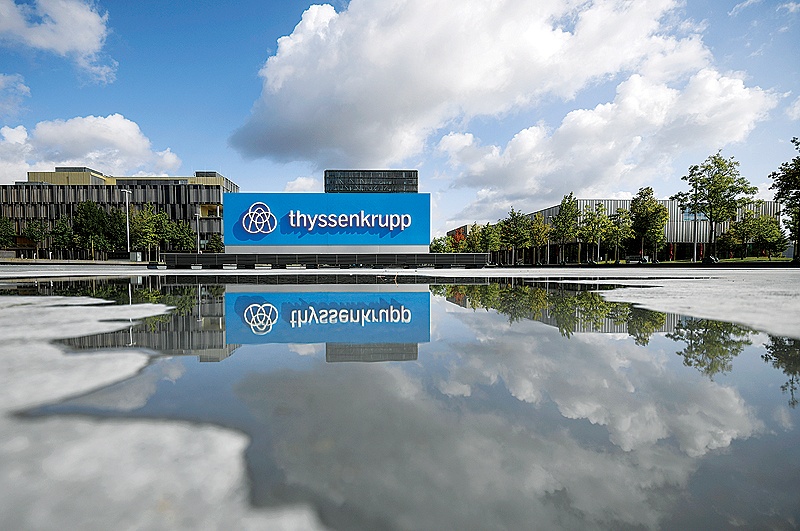Industrial giant Thyssenkrupp relinquishes blue-chip status
BERLIN: Weaker demand from abroad drove a bigger-than-expected drop in German industrial orders in July, suggesting that struggling manufacturers could tip Europe's biggest economy into a recession in the third quarter. Germany's export-reliant economy is suffering from slower global growth and business uncertainty caused by US President Donald Trump's 'America First' trade policies and Britain's planned, but delayed, exit from the European Union. Contracts for 'Made in Germany' goods fell 2.7 percent from the previous month in July, data showed yesterday, driven by a big drop in bookings from non-euro zone countries, the economy ministry said. That undershot a Reuters consensus forecast for a 1.5 percent drop.
"The misery in manufacturing continues. The decline in new orders significantly increases the risk of a recession for the German economy," VP Bank analyst Thomas Gitzel said. Germany's gross domestic product contracted by 0.1 percent quarter-on-quarter in the second quarter on weaker exports, with the decrease in foreign sales mainly driven by Britain and below average demand from China.
"The danger is great that negative growth will also be recorded in the third quarter," Gitzel added. The economy ministry said new orders in manufacturing had a weak start to the third quarter and that the outlook for the sector was also looking grim.
"In light of still unresolved international trade conflicts and muted business expectations in manufacturing, there are still no signs of a fundamental improvement in the industrial sector in the coming months," the ministry added. Orders from non-euro zone countries plunged nearly 7 percent on the month while demand from other euro zone countries and domestic bookings rose slightly, the data showed.
Without the distorting effects of bulk orders, industrial orders rose 0.5 percent on the month in July, the ministry added. The overall reading for June was revised up to an increase of 2.7 from a previously reported 2.5 percent increase.

Little light
The VDMA business association said engineering orders in July fell by 3 percent in real terms from the previous year, driven by weaker demand from both domestic and foreign clients. "The business and export outlook is still gloomy for the second half of the year given the economic and political risks," VDMA chief economist Ralph Wiechers said. Germany's DIHK business association said that companies around the globe were reluctant to invest due to slowing world trade and growing business uncertainty.
"So there is little light on the horizon for German industry which is characterized by its large share of capital goods producers," DIHK economist Kevin Heidenreich. Carsten Brzeski from ING noted that the downward trend in manufacturing was not only driven by weaker foreign demand and trade conflicts.
Meanwhile, struggling German industrial conglomerate Thyssenkrupp is set for ejection from the DAX index of 30 leading shares on the Frankfurt stock exchange, operator Deutsche Boerse said late on Wednesday. The historic Essen-based giant's shoes will be filled from September 23 by MTU Aero Engines, which makes components for aircraft motors. Thyssen was a DAX member from the index's creation in 1987, becoming even weightier after a merger with rival Krupp in 1999. But its shares have plummeted more than 60 percent since 2018, with the European Commission's decision to block its merger with India's Tata in June worsening the slide. "There's no question we're disappointed to leave the DAX," chief executive Guido Kerkhoff said in a statement to AFP.
"We're now looking to the future, it's important to reconfigure the business in a more profitable way to win back investors' trust." Metzler bank analyst Pascal Spano judged that Thyssenkrupp "is currently only a shadow of its former self".
One sign of that is the fact that its elevators division, one of its slew of products from submarines to construction materials, is valued more highly than the business as a whole, at 14 billion euros ($15.4 billion). While Thyssenkrupp has dropped plans to split in two, it remains set on listing separately the highly profitable lifts unit. For MTU, the switch comes after a meteoric rise, multiplying its market value by 20 since the 2008-09 financial crisis. - Agencies










